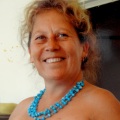Chengdu, day two, and we’re waiting for Dawei out the front. He’s a local painter who’s taking us on a studio tour before the Bookworm Artists’ Talk tonight.
When Dawei arrives he has soft cat eyes and a ponytail that reaches his waist. His English is good so it’s easy to talk and his painting is quite interesting too. Brushy figures painted from Brighton, some caught in the crack of a strobe light.
He’s been way too pious in cleaning up his space, like the other artists who we meet later. Brushes in a row and the super clean loo are a dead giveaway to us paint pigs. We drink Chengdu tea and smell in his oils, nearly filling the small space of his hideout.
Han Qing from Beijing is also with us. He’s an artist who shows with Redgate Gallery.
With no studio in town he hands out his catalogues, which have pale pink and light blue and yellow.
They’re all about light – or to do with the light – or of a light he says over. Not that these discrepancies had been of much worry to us. They are streetscapes at night and paintings of globes. It’s just an animated kind of one-way argument – the sort that I suspect might frustrate Xiao Ping.
Xiao Ping has been with us from the lucky get-go. He’s a towering tall and ever-dignified man – like a big screen movie star, or a poster of one of Mao’s crew.
Xiao’s quiet nature, which only occasionally breaks, gives him a curious mystique. It’s perhaps the result of time spent sitting down with the elderly Artists in Arnhem Land. Or maybe a lash back from his previous life growing up in the Cultural Revolution.
He does his best, despite his no-fuss nature, to encourage our conversation and questioning. He’s had the unfortunate job of being our right hand language man, on top of thinking through his own creative prerogatives.
Then we meet He Yi and Zhang Xi, both in different parts of town. They are stylish people in minimal flats that are bare and clean and cool out of the heat.
He Yi matches his paintings perfectly. He’s in shades of grey, like the walls of his place, with a smart purple string around one wrist. In his works are figures, rendered transparent, with a splash of one color in the corner of a limb.
Zhang Xi opens her door in square pajama pants and a bra-less blue tee. She’s a slight pretty woman who takes up position leaning next to a crystal clear ashtray. It holds just one butt placed central, like the fragile figures in her work. The burnt out end like one shock of black hair, like her own, which is cut in a fringe.
We have finished our tour so clean up our looks before heading to the Bookshop for presentation. Kate has organised the slideshow of images, which we rearrange in a stereotypical way – in the bus and at the last minute, poor thing.
When she takes the floor her presence is noticeably cool and particularly professional – she’s a woman in a role she was meant for.
Fiona then talks about her most recent project (on Queensland’s Opium trade) before the others start discussing their own. We watch her from the couch down low, sip on drinks, and listen intent. She looks like a Queen in a bright red shawl with glasses that sit down on her nose. She’s got a head of shiny curls – girly – almost at odds with her steady voice that says I’m serious better believe it.
Not usually a big gas bagger, it’s a rare opportunity to hear her articulate so much so eloquently and so candidly. We smile at each other and think, ah well, now that’s finally a real true gun artist. All those years of research help her to speak with accuracy – a problem we all seem to have when Capitan Kate springs the request back on us. We are asked to talk when our slides flick over.
From where I sit everyone speaks beautifully, and is perfectly fitted to their strange wears. But then over burgers we question our statements, and wonder why the hell we said that crap.
On the way home the boys and I get a ride with an impressive American student. She’s young and fluent and takes us to a graffiti grotto that she’s discovered and would like to show us. She says that it’s the first one in Chengdu, and it’s beside the Brocade River where the famous poet Du Fu was inspired.
We walk by the water where the taxi drops us off and finally find the old building. It’s dark inside save for the flash of our cameras that make out the paintjobs in brief moments.

All sounding great. Can’t wait to see you in less than two weeks!!